“Statements: African American Art from the Museum’s Collection” — Museum of Fine Arts Houston
Statements: African American Art from the Museum's Collection is the latest in a series of focused installations highlighting unique areas of strength in the collection of the Museum of Fine Arts, Houston. Featuring artists who have shaped the course of American art across eight decades, Statements brings together more than 40 works in a wide range of media, from Richmond Barthé’s iconic Feral Benga of 1935 to Mark Bradford’s Circa 1992, created in 2015.
The exhibition, which will be on display until Sep 25, 2016, presents three interwoven themes, starting with the generation of artists who came of age between the 1930s and 1960s, including John Biggers, Elizabeth Catlett, Melvin Edwards, and Loretta Pettway. Viewed as pioneers, these leaders and mentors are celebrated not only for their forward-looking work, but also for the recognition they received that helped break down institutional barriers.
The second segment of Statements focuses on artists who charted America's changing social landscape from the 1950s forward. The rise of Civil Rights is represented through photographs by Louise Ozell Martin, Gordon Parks, and Ernest C. Withers. Other, more subjective examples, reflect both urban and rural experience, including works by Jean Lacy, Lonnie Holley, and Thornton Dial, Sr.
The final section focuses on contemporary artists who directly challenge stereotypes and map the complexities of identity politics through portraiture and narrative. Among the artists represented are Mequitta Ahuja, Nick Cave, Glenn Ligon, and Kara Walker, along with many who have a strong Houston presence today, including Dawolu Jabari Anderson, Michael Ray Charles, Trenton Doyle Hancock, and Tierney Malone.
Click here for more information.
National Blues Museum opens in St. Louis
 The National Blues Museum opened last week in St. Louis. The facility explores the Blues and celebrates the genre as the foundation of all modern American music and educates guests in an entertaining environment that includes high impact technology driven experiences, a state-of-the-art theater, artifact-driven exhibits and robust public programming.
The National Blues Museum opened last week in St. Louis. The facility explores the Blues and celebrates the genre as the foundation of all modern American music and educates guests in an entertaining environment that includes high impact technology driven experiences, a state-of-the-art theater, artifact-driven exhibits and robust public programming.
The museum's announcement says: "Whether it’s jazz or folk, country or pop, rock or rap, the Blues has exerted a deep, profound influence that resonates to this day. Part of the reason is that it has always expressed emotional, heartfelt truths about life that continue to speak to generations of listeners, from all corners and walks of society. With distinct roots in centuries-old African-American culture, the Blues has always been about those feelings the word itself conjures up: feelings of sadness and solitude, and of being impacted by forces outside of one’s control. Throughout its existence, the essence of the Blues has remained constant, reinforcing basic elements that connect artists from different eras, geographies, and stylistic approaches. That’s because, above all, the Blues is a feeling as much as a form – and as universal as life itself."
Read the St. Louis Post-Dispatch story here. Take a virtual tour of the facility here.
Alaska Canada Military Highway: In Road-Building, Black Soldiers Defied Prejudice

1942 Cpl. Refines Sims Jr., left, and Pvt. Alfred Jalufkamet in the middle. Photo Credit: Army Corps of Engineers
From the New York Times several years ago, but another fresh piece of little known black history and an episode that contributed to President Truman integrating the army:
"In 1942, the Army Corps of Engineers assigned more than 10,000 men to build the Alaska Canada Military Highway. About a third were black soldiers: members of three newly formed “Negro regiments” the corps accepted for the job because it had no choice, other engineering units having been dispatched to the Pacific theater.
The black soldiers faced vicious cold, heat, mosquitoes and mud, like everyone else. But they also had to contend with relentless racism.
The Army was still segregated; black units were led by white officers. As late as 1936, a manpower assessment produced at the Army War College described black soldiers as shiftless, dishonest and lazy. “Say what you will,” the report declared, “the American Negro is still a primitive human being.”
Read the full story here.
Down the Road: Reda Lee Bland Evans
Another item in the series highlighting women throughout the history of PVAMU as this year the school celebrates it's 140th anniversary.
 Reda Lee Bland Evans was born October 9, 1913 to Erma Jean and Ollie Bland in Goliad, Texas. Evans entered Prairie View as a 16 year old Elementary Education major with a minor in history and mathematics. While a student, she was on both the varsity basketball and track teams. She was also a student worker in the campus laundry. After graduating from Prairie View Industrial and Mechanical College in 1936, Evans returned to Goliad to teach. She used her summers to work toward earning her Master of Science in Mathematics and Education at Prairie View, which she completed in 1944. She also took graduate classes at Syracuse University and Penn State University.
Reda Lee Bland Evans was born October 9, 1913 to Erma Jean and Ollie Bland in Goliad, Texas. Evans entered Prairie View as a 16 year old Elementary Education major with a minor in history and mathematics. While a student, she was on both the varsity basketball and track teams. She was also a student worker in the campus laundry. After graduating from Prairie View Industrial and Mechanical College in 1936, Evans returned to Goliad to teach. She used her summers to work toward earning her Master of Science in Mathematics and Education at Prairie View, which she completed in 1944. She also took graduate classes at Syracuse University and Penn State University.
In 1943, Evans came back to Prairie View to work as a Mathematic Instructor. In 1946, she became the Dean of Women. As the Dean of Women, her duties included: supervising seven residence hall (about 750 girls per building); supervising staff; building maintenance; ordering supplies; and managing three secretaries.
During her tenure at PV she worked closely with the Miss Prairie View Pageant; was a founder of the Women Council, Club Chic.; and was a member of the Epsilon Lambda Zeta Chapter of and Zeta Phi Beta Sorority, Inc. Evans retired from Prairie View A&M University in August 1983, after 40 years of service.
Evans married her husband, William Evans, in 1951 in Oklahoma City. He preceded her in death.
Evans’ favorite quote was by Katherine Mansfield: “how hard it is to escape from places. However carefully one goes, they hold you, you leave little bits of yourself fluttering on the fences, little rags and shreds of very life”.
TIPHC Bookshelf
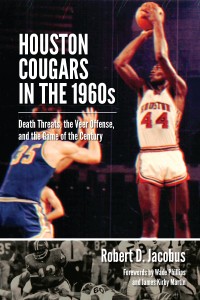 Published scholarship on black history in Texas is growing and we'd like to share with you some suggested readings, both current and past, from some of the preeminent history scholars in Texas and beyond. We invite you to take a look at our bookshelf page -- including a featured selection -- and check back as the list grows. A different selection will be featured each week. We welcome suggestions and reviews. This week, we offer, "Houston Cougars in the 1960s -- Death Threats, the Veer Offense, and the Game of the Century," by Robert D. Jacobus.
Published scholarship on black history in Texas is growing and we'd like to share with you some suggested readings, both current and past, from some of the preeminent history scholars in Texas and beyond. We invite you to take a look at our bookshelf page -- including a featured selection -- and check back as the list grows. A different selection will be featured each week. We welcome suggestions and reviews. This week, we offer, "Houston Cougars in the 1960s -- Death Threats, the Veer Offense, and the Game of the Century," by Robert D. Jacobus.
But the game would never have happened if Houston coach Guy Lewis had not recruited two young black men from Louisiana in 1964: Don Chaney and Elvin Hayes. Despite facing hostility both at home and on the road, Chaney and Hayes led the Cougars basketball team to 32 straight victories.
Similarly in Cougar football, coach Bill Yeoman recruited Warren McVea in 1964, and by 1967 McVea had helped the Houston gridiron program lead the nation in total offense.
Houston Cougars in the 1960s features the first-person accounts of the players, the coaches, and others involved in the integration of collegiate athletics in Houston, telling the gripping story of the visionary coaches, the courageous athletes, and the committed supporters who blazed a trail not only for athletic success but also for racial equality in 1960s Houston.
This Week In Texas Black History, Apr. 3-9
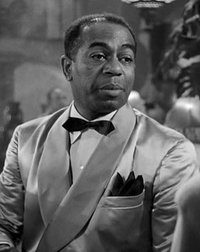 3 – In 1886, musician Arthur “Dooley” Wilson was born on this day in Tyler. Wilson is most notably known for his role as “Sam,” the piano player in the Humphrey Bogart film, “Cassablanca,” and the target of the famous line, “Play it again, Sam,” in reference to the song, “As Time Goes By.” Ironically, Wilson was actually a drummer and couldn’t play piano. In the film, he mimicked the hand movements of an off-screen pianist. Wilson also appeared on Broadway, including the play, "Cabin in the Sky."
3 – In 1886, musician Arthur “Dooley” Wilson was born on this day in Tyler. Wilson is most notably known for his role as “Sam,” the piano player in the Humphrey Bogart film, “Cassablanca,” and the target of the famous line, “Play it again, Sam,” in reference to the song, “As Time Goes By.” Ironically, Wilson was actually a drummer and couldn’t play piano. In the film, he mimicked the hand movements of an off-screen pianist. Wilson also appeared on Broadway, including the play, "Cabin in the Sky."
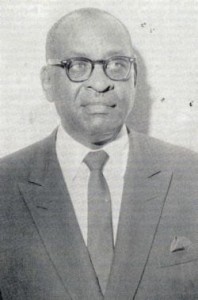 3 -- In 1944, on this day, the U.S. Supreme Court rules in Smith v. Allwright that Texas’ "White primaries" could not exclude black voters. Civil Rights activist Dr. Lonnie Smith, a dentist, had attempted to vote in the 1940 Democratic Primary but was denied a ballot at his Houston precinct because voting was open only to whites. With help from the NAACP, Smith filed a suit that reached the U.S. Supreme Court which ruled in his favor, opening primary voting to all eligible Texans.
3 -- In 1944, on this day, the U.S. Supreme Court rules in Smith v. Allwright that Texas’ "White primaries" could not exclude black voters. Civil Rights activist Dr. Lonnie Smith, a dentist, had attempted to vote in the 1940 Democratic Primary but was denied a ballot at his Houston precinct because voting was open only to whites. With help from the NAACP, Smith filed a suit that reached the U.S. Supreme Court which ruled in his favor, opening primary voting to all eligible Texans.
 4 – On this day in 1974, Oscar DuConge (pronounced "dew-con-jay") was elected Waco's first African American mayor. Born in Pass Christian, Miss., the ninth of 14 children, DuConge grew up in New Orleans and graduated from Xavier University in 1931 with a degree in sociology. He moved to Waco in September 1948 following World War II and serving in the Army. He rose to political prominence when he was elected to the Waco City Council in 1972.
4 – On this day in 1974, Oscar DuConge (pronounced "dew-con-jay") was elected Waco's first African American mayor. Born in Pass Christian, Miss., the ninth of 14 children, DuConge grew up in New Orleans and graduated from Xavier University in 1931 with a degree in sociology. He moved to Waco in September 1948 following World War II and serving in the Army. He rose to political prominence when he was elected to the Waco City Council in 1972.
 4 – Paul Quinn College was founded by a small group of African Methodist Episcopal preachers in Austin on this day in 1872. The school was relocated to Waco in 1877 and then to Dallas in 1990. The school is the oldest liberal arts college for African Americans in Texas and was named after William Paul Quinn who was A.M.E. Bishop of the Western States.
4 – Paul Quinn College was founded by a small group of African Methodist Episcopal preachers in Austin on this day in 1872. The school was relocated to Waco in 1877 and then to Dallas in 1990. The school is the oldest liberal arts college for African Americans in Texas and was named after William Paul Quinn who was A.M.E. Bishop of the Western States.
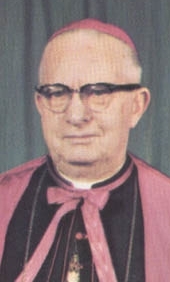 5 -- Six weeks before the U.S. Supreme Court decision in Brown v. Board of Education, Archbishop Robert Lucey announced on this day in 1954 that all of San Antonio's parochial schools and the city's two Catholic colleges would be integrated.
5 -- Six weeks before the U.S. Supreme Court decision in Brown v. Board of Education, Archbishop Robert Lucey announced on this day in 1954 that all of San Antonio's parochial schools and the city's two Catholic colleges would be integrated.
 6 -- Jazz pianist and black activist Horace Tapscott was born this day in Houston in 1934. By age six he had become a competent pianist. His family moved to Los Angeles in 1943 and Tapscott began his career and would play with Lionel Hampton though primarily as a trombonist, and would be a member of Motown Records' West Coast band, backing such groups as the Supremes. Tapscott founded the Pan Afrikan Peoples Arkestra, also known as the Ark, a collective group dedicated to preserving and developing African-American musical traditions and promoting cultural and musical education. It also distributed free food to families in Watts and made available meeting space for black radicals such as Stokely Carmichael and H. Rap Brown. Tapscott released fourteen albums.
6 -- Jazz pianist and black activist Horace Tapscott was born this day in Houston in 1934. By age six he had become a competent pianist. His family moved to Los Angeles in 1943 and Tapscott began his career and would play with Lionel Hampton though primarily as a trombonist, and would be a member of Motown Records' West Coast band, backing such groups as the Supremes. Tapscott founded the Pan Afrikan Peoples Arkestra, also known as the Ark, a collective group dedicated to preserving and developing African-American musical traditions and promoting cultural and musical education. It also distributed free food to families in Watts and made available meeting space for black radicals such as Stokely Carmichael and H. Rap Brown. Tapscott released fourteen albums.
 7 – On this day in 1954, All-Pro running back Tony Dorsett was born in Rochester, Pa. At the University of Pittsburgh, Dorsett won the 1976 Heisman Trophy and was a first round pick (No. 2 overall) by the Dallas Cowboys in the 1977 NFL Draft. He was Offensive Rookie of the Year and in 1994 was inducted to both the Pro Football and College Football halls of fame. That same year, he was also enshrined in the Texas Stadium Ring of Honor. Dorsett rushed for 12,739 yards (8th all-time) and 77 touchdowns in his 12-year career. His 99-yard touchdown run on January 3, 1983 against the Minnesota Vikings is the longest run from scrimmage in NFL history. See the run here.
7 – On this day in 1954, All-Pro running back Tony Dorsett was born in Rochester, Pa. At the University of Pittsburgh, Dorsett won the 1976 Heisman Trophy and was a first round pick (No. 2 overall) by the Dallas Cowboys in the 1977 NFL Draft. He was Offensive Rookie of the Year and in 1994 was inducted to both the Pro Football and College Football halls of fame. That same year, he was also enshrined in the Texas Stadium Ring of Honor. Dorsett rushed for 12,739 yards (8th all-time) and 77 touchdowns in his 12-year career. His 99-yard touchdown run on January 3, 1983 against the Minnesota Vikings is the longest run from scrimmage in NFL history. See the run here.
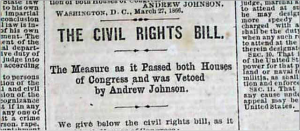 9 – On this day, the Civil Rights Act of 1866 became effective, granting citizenship and the same rights enjoyed by white citizens to all male persons in the United States "without distinction of race or color, or previous condition of slavery or involuntary servitude." President Andrew Johnson's veto of the bill was overturned by a two-thirds majority in both houses of Congress, and the bill became law.
9 – On this day, the Civil Rights Act of 1866 became effective, granting citizenship and the same rights enjoyed by white citizens to all male persons in the United States "without distinction of race or color, or previous condition of slavery or involuntary servitude." President Andrew Johnson's veto of the bill was overturned by a two-thirds majority in both houses of Congress, and the bill became law.
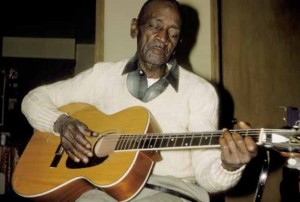 9 – On this day in 1895, blues singer and guitarist Bowdie Glenn Lipscomb was born in Navasota. As a youngster, Lipscomb would take the name “Mance,” short for “Emancipation,” the name of an elder family friend. Lipscomb, who preferred to be known as a "songster" because of the variety of songs he sang, was discovered and first recorded in 1960 during the country blues revival. The annual Navasota Blues Festival is held in his honor. A bronze sculpture of him was unveiled in Mance Lipscomb Park in Navasota on 2011.
9 – On this day in 1895, blues singer and guitarist Bowdie Glenn Lipscomb was born in Navasota. As a youngster, Lipscomb would take the name “Mance,” short for “Emancipation,” the name of an elder family friend. Lipscomb, who preferred to be known as a "songster" because of the variety of songs he sang, was discovered and first recorded in 1960 during the country blues revival. The annual Navasota Blues Festival is held in his honor. A bronze sculpture of him was unveiled in Mance Lipscomb Park in Navasota on 2011.
Blog: Ron Goodwin, author, PVAMU history professor
Ron Good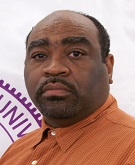 win's bi-weekly blog appears exclusively for TIPHC/TBHPP. Goodwin is a San Antonio native and Air Force veteran. Generally, his column will address contemporary issues in the black community and how they relate to black history. He and the TIPHC/TBHPP staff welcome your comments. In his latest blog, "It’s a black thing (?), Goodwin addresses the O.J. Simpson trial, and its TV depiction, and police harassment of African Americans. Read it here.
win's bi-weekly blog appears exclusively for TIPHC/TBHPP. Goodwin is a San Antonio native and Air Force veteran. Generally, his column will address contemporary issues in the black community and how they relate to black history. He and the TIPHC/TBHPP staff welcome your comments. In his latest blog, "It’s a black thing (?), Goodwin addresses the O.J. Simpson trial, and its TV depiction, and police harassment of African Americans. Read it here.
Submissions Wanted
Historians, scholars, students, lend us your...writings. Help us produce the most comprehensive documentation ever undertaken for the African American experience in Texas. We encourage you to contribute items about people, places, events, issues, politics/legislation, sports, entertainment, religion, etc., as general entries or essays. Our documentation is wide-ranging and diverse, and you may research and write about the subject of your interest or, to start, please consult our list of suggested biographical entries and see submission guidelines. However, all topics must be approved by TIPHC/TBHPP editors before beginning your research/writing.
We welcome your questions or comments via email or telephone – mdhurd@pvamu.edu, ![]() 936-261-9836.
936-261-9836.
